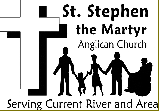Prayer
Quite often we think of prayer as saying something to God, and it is. A prayer can be read from a book, recited from memory, or said freely or extemporaneously. But prayer is also being quiet and listening to God.
In the Anglican tradition using written prayers is an accepted way to pray. Both the Book of Common Prayer (BCP) and the Book of Alternative Services (BAS) have many beautiful and meaningful prayers. Look through each book and you will find them; pay particular attention to the “Occasional Prayers” section.
Jesus gave us the Lord’s Prayer when the disciples asked him to teach them how to pray. Each line in the prayer asks for something basic. Try praying the Lord’s Prayer one line at a time and take a few moments to reflect on the line you just prayed.
Yet sometimes reading prayers is not meaningful. Because we have different personalities, different ways of praying are more meaningful than others. For some visual imagery is important, like looking at a stained-glass window, , an icon, or a view over the lake. For others, movement is vital like dancing or modeling in clay. And for others, music or the spoken word is valuable. Pay attention to what works for you and pray in a way which is most helpful.
A visual person sitting in a church looks at the pictures and symbols in a church or sitting on a hillside overlooking a lake takes in the view. In both cases, one can sense the presence of God through what is seen.
Yet walking or working outside also has a dimension of prayer. Getting “lost” in what one is doing allows one’s mind to reflect. One of the most beneficial times of prayer was when I worked in the bush as a regen cruiser (looking for trees 2 inches tall). Walking in the beauty of the bush allowed me to pray. Gardeners find working with the soil and plants a spiritual activity.
Music, whether classical or religious, can also help one to pray. Some who are more musical find playing an instrument is a mystical experience.
Poetry speaks to some. Reading scripture and reflecting or meditating on the story or a particular verse may be helpful.
Pointers to prayer are knowing scripture verses and stories by memory because the Holy Spirit reminds us of them as we pray, which is a way for God to speak to us.
Routine helps us pray. Prayer, like exercise, is something which is most helpful when done regularly. Find a time in your day for prayer which is consistent.
Sometimes prayer is spoken out loud, other times it is thoughts in our head. We can ask God specifically for something or tell God how we are feeling. We can pray while doing an activity. What we are looking at can help us to pray.
Prayer is a communication with God. Sometimes God speaks to us this way when thoughts enter our heads and feelings enter our hearts. When we seek God, God’s voice can be discerned.
See also:


